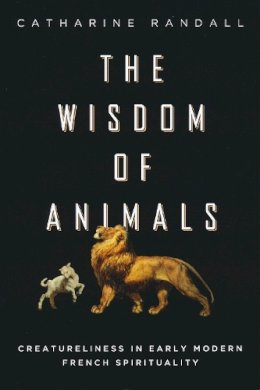Catharine Randall is senior lecturer in religion at Dartmouth College. She is the author of a number of books, including Black Robes and Buckskin: A Selection from the "Jesuit Relations" and From a Far Country: Camisards and Huguenots in the Atlantic World.
“Early modern scholars will be grateful to Catherine Randall for bringing Bougeant’s fascinating and little-known work to a wider readership. The Wisdom of Animals does begin, as its author claims, to map the many overlapping fields that comprise the study of early modern theology and the natural world. . .” —Medievalia et Humanistica “Catharine Randall’s The Wisdom of Animals: Creatureliness in Early Modern French Spirituality argues . . . that religious writings and practices in early modern Europe reveal a shift toward increased compassion for animals that contributed directly to the animal rights movement and contemporary calls for animal liberation. The Wisdom of Animals represents a highly original contribution to the history of thinking about and thinking with animals.” —Modern Philology “Drawing on a broad interdisciplinary context, Randall eruditely weaves together theology, anthropology, animal studies, and literature. . . She does a first-rate job exploring the significance of animals in each narrative in the context of their relationship to authority and tradition.” —Sixteenth Century Journal “Catharine Randall has written a welcome contribution to the growing scholarship on animals and early modern cultures . . . . It is a testament to the interest of Randall’s analysis that the reader might be left wanting more.” —Modern Language Review “In this book, Randall has offered the reader multiple avenues for entry: as a historian of animals, as one of early modern spirituality or of currents in the proto-scientific movement, and as an individual on a personal spiritual journey. Randall leaves the reader with many directions for further research . . . . Randall has produced a book provocative in its methodological apparatus, valuable in its textual analysis, and stimulating less for its conclusions than for its inspiration toward further research.” —H-France Review “Randall’s book is an amazing testimony of the fact that early modernity did not only bring us René Descartes and his animal-despising philosophy but also has to offer animal-friendly philosophers, theologians, and poets. The book made me ponder how much human animals can learn from non-human animals and how much wisdom and ingenuity animals possess.” —Journal of Animal Ethics “This book is not without merits: the study of the swallow as an emblem and figure of Montaigne’s hermeneutics, for example, is a highly sophisticated reading of the literary uses of animals.” —Renaissance Quarterly “. . . an engaging and lively piece of scholarly exposition. Randall’s writing is fluent, the theological background is accessibly incorporated into the argument, and the succinct conclusion is compelling, uniting as it does a range of ‘creatures . . . who [open] up new, vibrant ways of experiencing both this world and that beyond it.’” —French Studies "Catharine Randall has written an informative, erudite, and convincing study of the complexity of thought concerning animals in the early modern period, and the importance of theological perspectives for that thought. The Wisdom of Animals: Creatureliness in Early Modern French Spirituality is an original contribution to the field, and is of potential interest not only to scholars of early modern French history and literature, but also to readers interested in religious studies, the history of animality, and the antecedents to current discussions of the status and rights of animals." —Kathleen Perry Long, Cornell University "Here is a book that breathes and inspires: terse and compelling, every page written with flair and force, The Wisdom of Animals reaches into the past to remind us that we are animals and that we must commit our faith to the world that, by no casual miracle, it is a gift for us to inhabit. Randall’s informed and sustained readings of a panoply of early modern writers tell us, in both their words and hers, why the intricate webbings of our ecosphere must be nurtured and cherished. Weaving together literature, theology and philosophy, she affirms over and again how and why animal wisdom is vital for the present and future of our imperiled planet." —Tom Conley, Abbot Lawrence Lowell Professor of Romance Languages and Literatures, Harvard University

